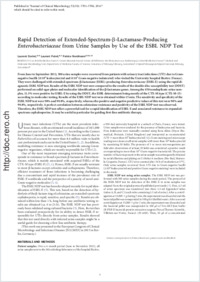Rapid detection of extended-spectrum-β-lactamase-producing Enterobacteriaceae from urine samples by use of the ESBL NDP test
- Dortet, Laurent INSERM U914, Le Kremlin-Bicêtre, France - Centre National Associé-Centre de Référence des Résistances aux Antibiotiqus, Le Kremlin-Bicêtre, France
- Poirel, Laurent INSERM U914, Le Kremlin-Bicêtre, France - Medical and Molecular Microbiology Unit, Department of Medicine, Faculty of Science, University of Fribourg, Switzerland
- Nordmann, Patrice INSERM U914, Le Kremlin-Bicêtre, France - Centre National Associé-Centre de Référence des Résistances aux Antibiotiqus, Le Kremlin-Bicêtre, France - Medical and Molecular Microbiology Unit, Department of Medicine, Faculty of Science, University of Fribourg, Switzerland - Hôpital Cantonal, Fribourg, Switzerland
-
10.01.2014
Published in:
- Journal of Clinical Microbiology. - 2014, vol. 52, no. 10, p. 3701–3706
English
From June to September 2012, 500 urine samples were recovered from patients with urinary tract infections (UTI) due to Gram-negative bacilli (≥10⁴ leukocytes/ml and ≥10⁵ Gram-negative isolates/ml) who visited the University hospital Bicêtre (France). They were challenged with extended-spectrum-β-lactamase (ESBL)-producing Enterobacteriaceae (ESBL-E) using the rapid diagnostic ESBL NDP test. Results of the ESBL NDP test were compared to the results of the double-disc susceptibility test (DDST) performed on solid-agar plates and molecular identification of the β-lactamase genes. Among the 450 nonduplicate urine samples, 11.3% were positive for ESBL-E by using the DDST, the ESBL determinants being mostly of the CTX-M type (CTX-M-15) according to molecular testing. Results of the ESBL NDP test were obtained within 15 min. The sensitivity and specificity of the ESBL NDP test were 98% and 99.8%, respectively, whereas the positive and negative predictive values of this test were 98% and 99.8%, respectively. A perfect correlation between cefotaxime resistance and positivity of the ESBL NDP test was observed. Therefore, the ESBL NDP test offers a powerful tool for a rapid identification of ESBL-E and associated resistance to expanded-spectrum cephalosporins. It may be useful in particular for guiding first-line antibiotic therapy.
- Faculty
- Faculté des sciences et de médecine
- Department
- Médecine 3ème année
- Language
-
- English
- Classification
- Biological sciences
- License
- License undefined
- Identifiers
-
- RERO DOC 213286
- DOI 10.1128/JCM.01578-14
- Persistent URL
- https://folia.unifr.ch/unifr/documents/303690
Statistics
Document views: 45
File downloads:
- nor_rde.pdf: 104
